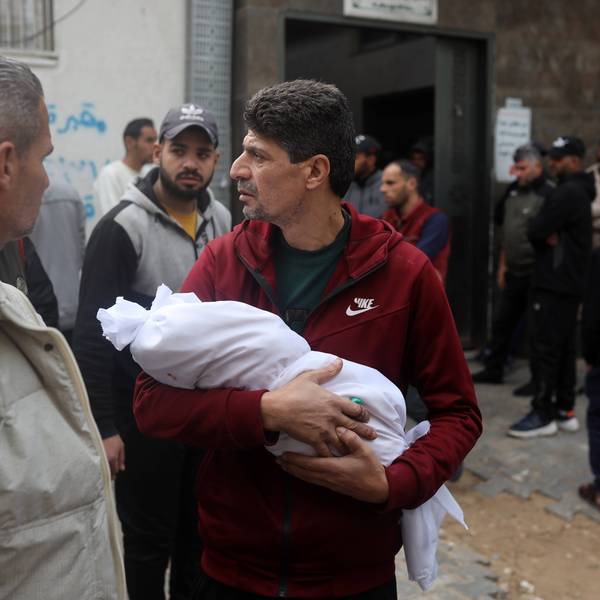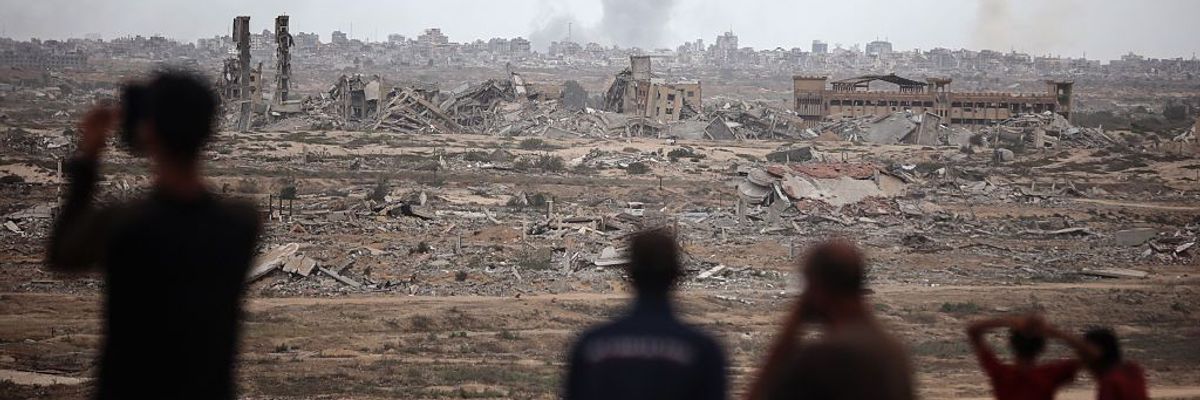After two years of destruction in the Gaza Strip, Israel signed a ceasefire agreement with Hamas on Thursday that is expected to take effect within the next day. But even as the world reacts with jubilation that the nonstop death and destruction may soon abate, skepticism abounds about whether the agreement will result in a just and lasting peace.
Israel is expected to withdraw troops to an agreed-upon line and to allow an influx of aid into Gaza, along with releasing Palestinian prisoners in exchange for Israeli hostages. Already, signs have emerged that the Israeli government may seek to collapse the fragile agreement, as happened earlier this year.
Francesca Albanese, the UN special rapporteur on the occupied Palestinian territories, pointed out that within hours after the deal was announced by US President Donald Trump on Wednesday, Israeli tanks were filmed firing at civilians attempting to return to their homes in Gaza City.
Middle East Eye reported: "Heavy airstrikes and artillery shelling were reported in Gaza City and Khan Younis overnight, according to local media. Israeli quadcopters were also reported to have dropped bombs on civilians in Gaza City. At least nine people were killed in the attacks since dawn, health officials said."
Albanese said: "Just hours after the deal—as in January—Israel shoots at Palestinians waiting to return home. Before any next step, member states must ensure that Israel honors the ceasefire."
Whether the ceasefire will even be finalized remains an open question, as two leading far-right figures in Israeli Prime Minister Benjamin Netanyahu's government—Finance Minister Bezalel Smotrich and Security Minister Itamar Ben-Gvir—have come out in opposition to the deal's ratification and suggested that their parties may defect from Netanyahu's government if they don't get their way, which could be enough to collapse his narrow governing majority.
In a video at the Al-Aqsa Mosque compound on Jerusalem's Temple Mount on Wednesday, Ben-Gvir said Israel must pursue "full victory in Gaza," a move seen as deeply provocative by the Arab world outside one of Islam's holiest sites, made only more so by his declaration that "we [Jewish Israelis] are the owners of [the] Temple Mount."
In recent months, Ben-Gvir and Smotrich have said this goal of "total victory" includes carrying out the forced expulsion of Palestinians from Gaza so they can be replaced with Israeli settlers.
Even if this ceasefire proves more durable than previous ones, human rights advocates say that simply halting the violence is not enough.
"We can breathe again, in relief for the end of the daily killing, the starvation, the human suffering beyond imagination, beyond words," wrote Yoav Shemer-Kunz, the co-founder of European Jews for Palestine in EUObserver. "This much-needed and welcomed ceasefire does not change the simple fact that Israel has just committed a genocide in Gaza."
Over the past two years, more than 10% of Gaza's population has been the casualties of Israeli attacks: At least 67,000 people—including over 20,000 children—have been killed, while at least 169,000 people have been injured, many with life-altering wounds, according to official estimates from the Gaza Health Ministry. Other studies suggest the death toll may be even higher when the effects of disease and starvation are taken into account.
Craig Mokhiber, a former United Nations human rights official, said that while Israel and the US had agreed to end the "military component of [the] genocide... they have not yet ended the food and medical components of the genocide."
Nearly 78% of the buildings, including over 9 in 10 homes, in Gaza have been damaged or destroyed, leaving its medical, water, and sanitation infrastructure in ruins.
And as a result of Israel's near-total blockade on humanitarian aid, Gaza is now the center of a historic famine. According to the United Nations-backed Integrated Food Security Phase Classification (IPC), nearly a third of the population—641,000 people—is estimated to face catastrophic conditions of hunger, while 1 in 4 children suffers from acute malnutrition.
"A temporary pause or reduction in the scale of attacks and allowing a trickle of humanitarian aid into Gaza is not enough," said Agnès Callamard, the secretary general of Amnesty International.
"There must be a full cessation of hostilities and a total lifting of the blockade," she said. "Israel must allow the unhindered flow of basic supplies, including food, medicine, fuel, and reconstruction material, into all parts of the occupied Gaza Strip, as well as the restoration of essential services, to ensure the survival of a population reeling from starvation, repeated waves of mass forced displacement, and a campaign of annihilation."
Though the deal signed Thursday calls for 400 aid trucks to begin entering the strip each day, marking a massive surge from previous levels, it is still fewer than the 600 per day that were allowed to enter during January's ceasefire, which occurred when starvation was at a less critical point.
Though the ceasefire will require the withdrawal of some troops, Israel has said it will still control 53% of the Gaza Strip after it goes into effect and the prisoner exchange ends.
"This fragile ceasefire must be the beginning of a sustained and principled effort that leads to ending Israel's unlawful occupation and blockade," said Oxfam International. "It must be focused on restoring rights and rebuilding lives. Any political or reconstruction plan must not entrench the occupation or further undermine Palestinian sovereignty."
Others emphasized the importance not just of remedies to the suffering of Palestinians, but legal accountability for those in Israel's government, including Netanyahu and former Defense Minister Yoav Gallant, for whom the International Criminal Court has issued arrest warrants for crimes against humanity.
"The current plan—the so-called 'Trump peace plan'—falls woefully short in this," said Callamard. "It fails to demand justice and reparations for victims of atrocity crimes or accountability for perpetrators. Stopping the cycle of suffering and atrocities requires an end to longstanding impunity at the heart of recurring violations in Israel and the occupied Palestinian territories. States must uphold their obligations under international law to bring to justice those responsible for war crimes, crimes against humanity, or genocide."
Mokhiber said: "We must keep the pressure on until all perpetrators and complicit actors are held accountable for the genocide, the apartheid regime is dismantled, and Palestine is free."




